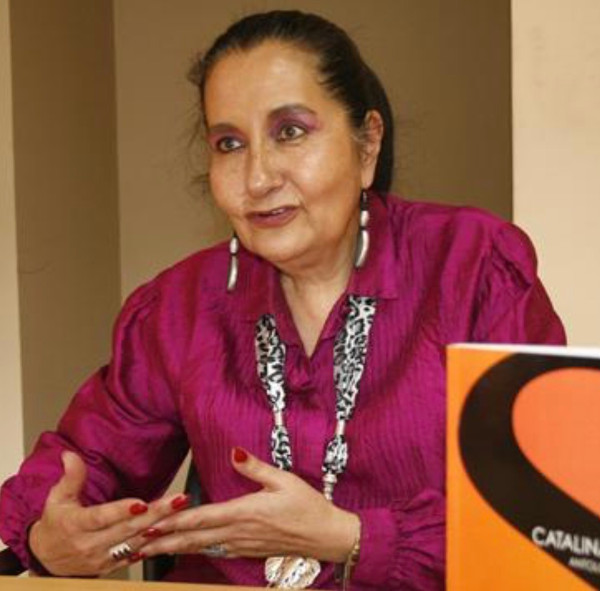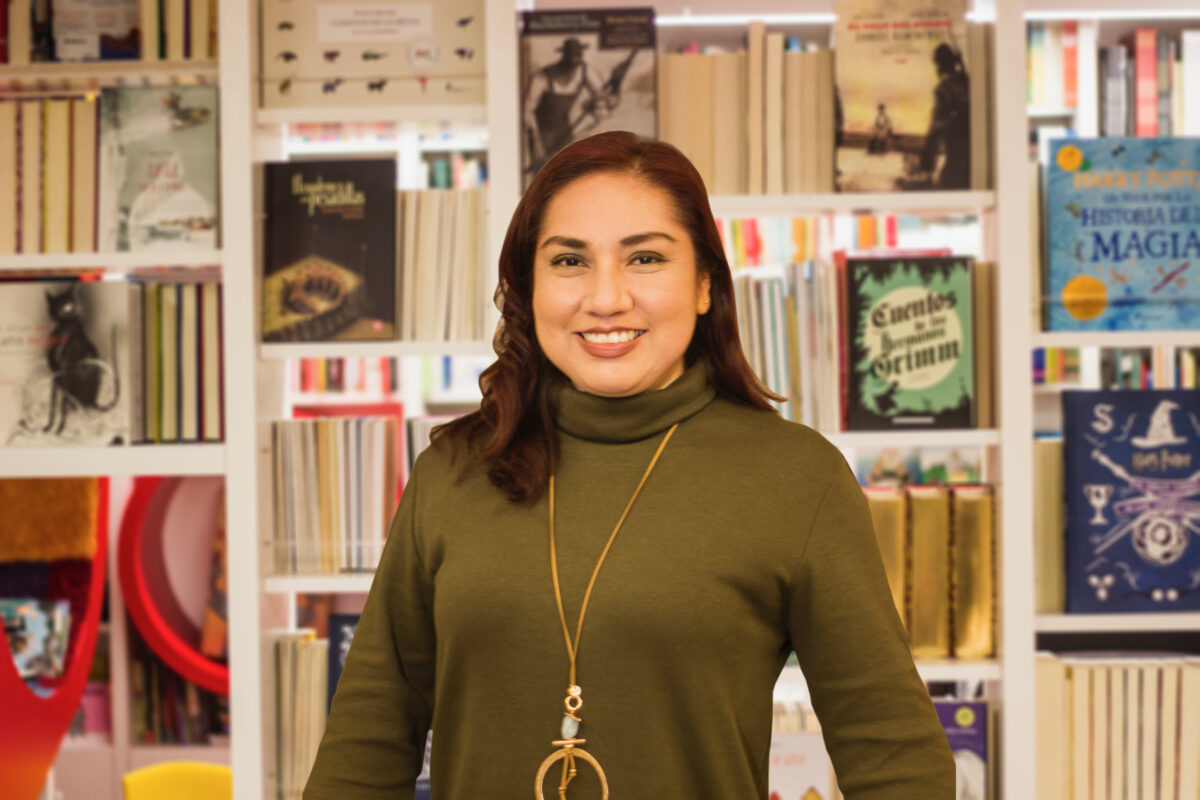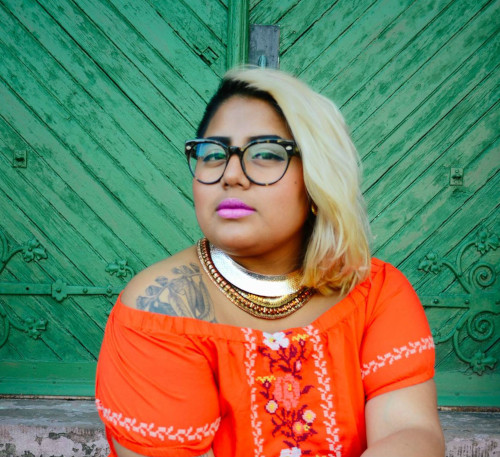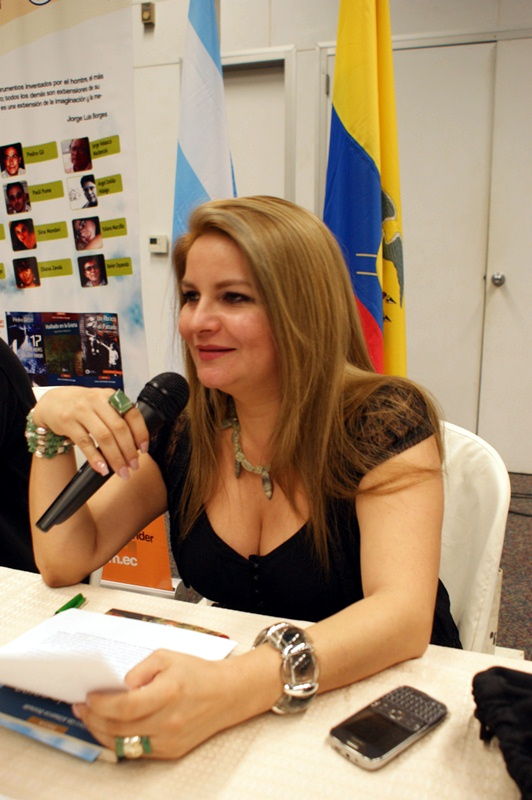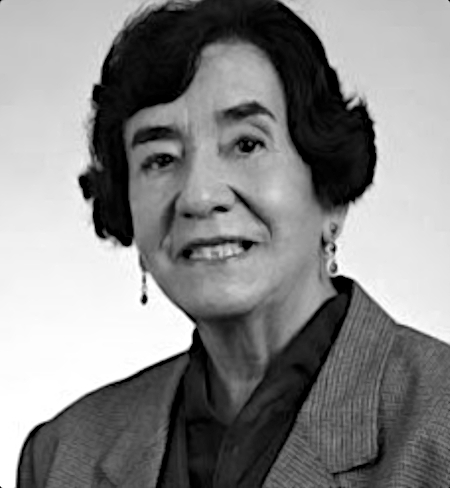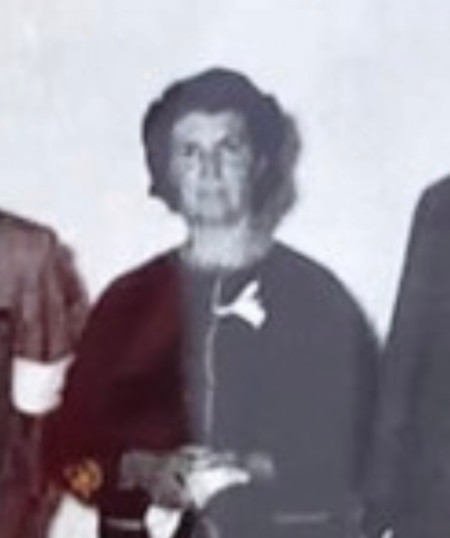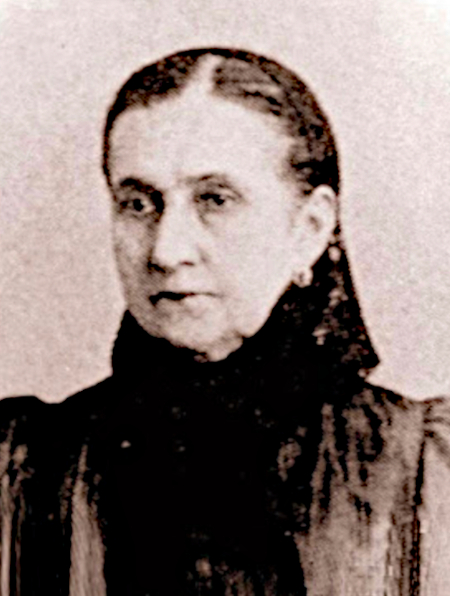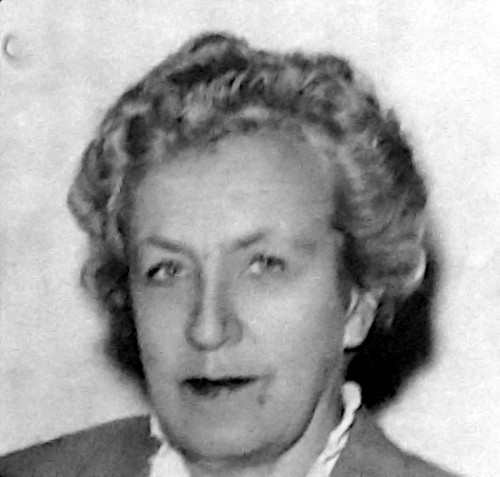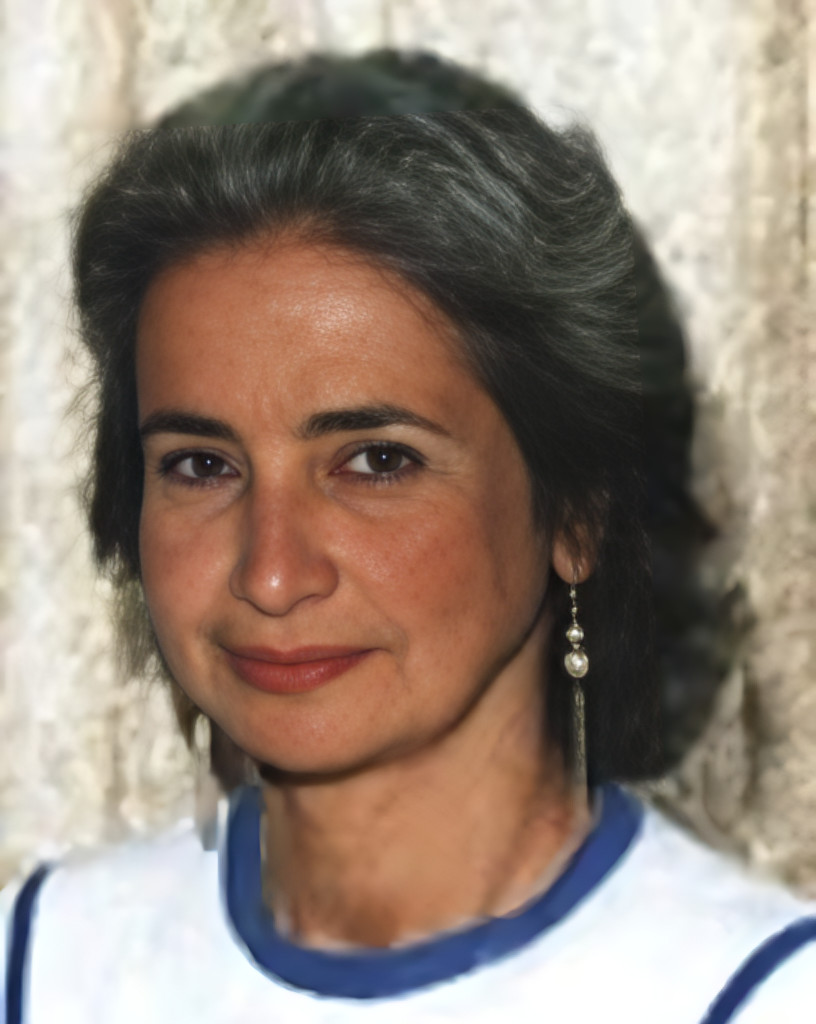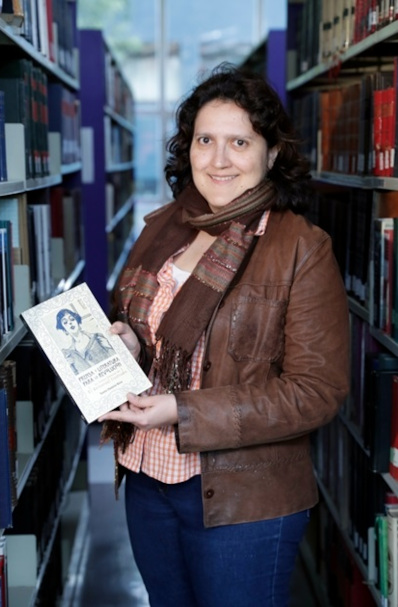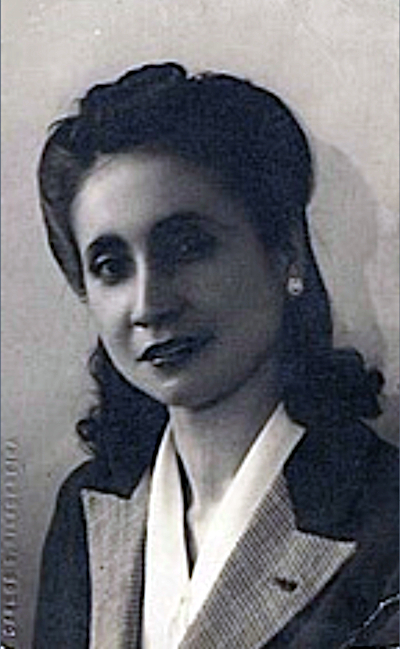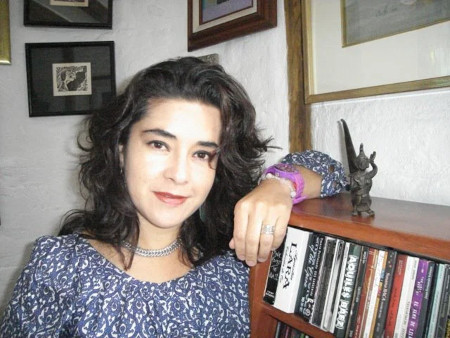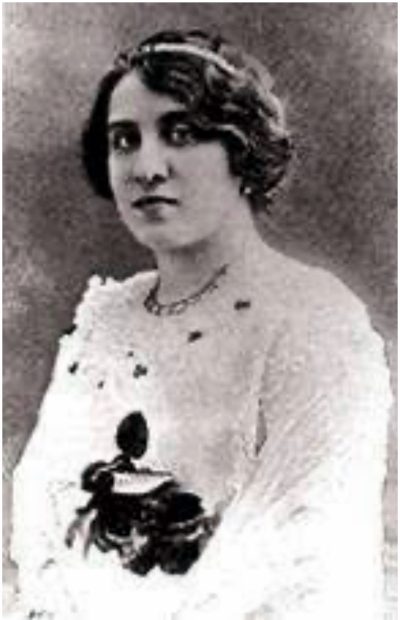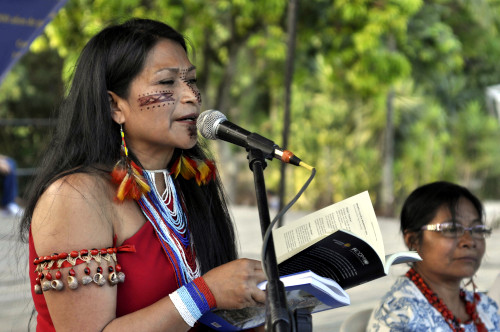Catalina Sojos Mata (Cuenca, 1951) is a poet, writer, columnist, author of children’s literature, and a translator. In 1989, at the age of 37, she published her first poetry book: Hojas de poesía. She has been awarded the Gabriela Mistral National Poetry Prize, 1989, and the Jorge Carrera Andrade Prize, 1992. She is currently the director of the Manuel A. Landívar Museum in Cuenca, Ecuador.
Continue reading “Catalina Sojos”Category: Female writers
Solange Rodríguez
Solange Rodríguez Pappe (Guayaquil, Ecuador, 1976) is an Ecuadorian writer and professor known for her short fiction in the genres of fantasy, horror, and the strange. She has published several acclaimed collections, including Balas perdidas (2010), which won the Joaquín Gallegos Lara Award for Best Storybook of the Year. A longtime educator, Rodríguez has also been honored with the Matilde Hidalgo Prize for her academic career. Her works often explore themes of the fantastic and macabre, and have been translated into multiple languages, gaining international recognition.
Continue reading “Solange Rodríguez”Sonia Guiñansaca
Sonia Guiñansaca (Cuenca, 1989) is a migrant poet, cultural organizer and activist whose work aims for culture equality and social justice, focusing on migrant rights, climate change, LGBTQ+ rights, and gender discrimination. At the age of 5 Guiñansaca migrated to the United States to reunite with her parents in New York City.
Continue reading “Sonia Guiñansaca”Siomara España
Siomara España Muñoz (Paján, January 4, 1976) is an Ecuadorian poet, essayist, professor and literary critic. She has been the director of the literature branch of the Guayas chapter of the House of Ecuadorian Culture, a high school teacher, a literature professor at the University of Guayaquil, the director of the School of Literature in the Faculty of Philosophy of the University of Guayaquil, the director of Research and Postgraduate Studies at the University of the Arts, and a professor of literature at the University of the Arts.
Continue reading “Siomara España”Fanny Carrión de Fierro
Fanny Carrión de Fierro (1936) is an Ecuadorian poet, literary critic, essayist and university professor. She is a 4-time winner of Ecuador’s Gabriela Mistral National Poetry Award. She has published essays on a variety of topics, including politics, culture, and society. Her poems have also appeared in English-language anthologies such as “These Are Not Sweet Girls: Poetry by Latin American Women” (1994) and “Eye to Eye-Women: Their Words and Worlds” (1997). She has taught at several universities in Ecuador and the United States. She is currently a professor at Ecuador’s Pontifical Catholic University (Quito). She has also been a visiting professor and Fulbright Scholar at Keene State College in New Hampshire, Willamette University in Oregon, and several other universities in Ecuador. Her work has been translated into English.
Family
Fanny Carrión de Fierro’s parents were Luis Enrique Carrión Carvajal and Leonor Acosta from Ibarra, Ecuador. Carrión de Fierro married Gustavo Adolfo Fierro Zevallos (Ph.D. in linguistics). They had four children: Gustavo Adolfo, Patricia Natalia, Luis Alberto and Pablo Fernando.
Education
She received a Doctorate in Literature from the Pontifical Catholic University of Ecuador (Quito, 1981), as well as a Master of Arts degree from the University of California at Berkeley, and a Bachelor’s degree (Licenciatura) in Education from the Central University of Ecuador.
She has been on the board of the Association of College Professors of the Pontifical Catholic University of Ecuador in Quito. She is also on the board on several development non-governmental organizations.
Member of
- “Grupo America” – an Ecuadorian literary group.
- Casa de la Cultura Ecuatoriana [Ecuadorian House of Culture], Literature Section.
Works
Poetry
- En la Voz del Silencio (1980)
- Ten poems translated into English included in the anthology These are not Sweet Girls, Poetry by Latin American Women, edited by Marjorie Agosin (1994)
- Where light was born: A personal anthology of selected poems by Fanny Carrión de Fierro (1999; translated by Sally Cheney Bell)
- Donde nació la Luz: Antología Personal (2000)
- Desde el beso del tiempo and Esta voz, in Poetic Voices without Borders, edited by Robert L. Girón (2005)
- Alfa Amor, Donde Nació la Luz and Geografía del Corazón, in Poetic Voices without Borders 2, edited by Robert L. Girón (2009)
- Ecuador, on erotic attraction, “Hidden Pleasure” in Eye to Eye-Women: Their Words and Worlds, edited by Vanessa Baird, introduction by Anita Desai (1997)
Short stories
- The Golden Ear of Corn and Other Stories, bilingual collection of short stories. Centro de Publicaciones de la Pontificia Universidad Católica del Ecuador, October 2010.
Criticism
- José de la Cuadra: Precursor del realismo mágico hispanoamericano (1993)
- Los Sangurimas, novela precursora de Cien Años de soledad, an essay about the novel “Los Sangurimas” by José de la Cuadra
- Cien Años de Soledad, Historia y Mito de lo Americano, in: Lectura de García Márquez (Doce Estudios), edited by Manuel Corrales Pascual (Quito: Centro de Publicaciones de la Pontifica Universidad Católica de Ecuador, 1975)
Awards
- Gabriela Mistral National Poetry Award (1958, 1961, 1981 and 1985)
- National Poetry Award of Ecuador (1962)
- “Juana de Ibarbuoru” Poetry Prize, Montevideo, Uruguay (1995).
Other writers with the last name Carrión
Fanny León Cordero
Fanny León Cordero (Gualaceo Canton, October 15, 1920) was an Ecuadorian jurist and poet. León was a member of the Association of Contemporary Writers of Ecuador, whose annual poetry contest is named after her. In 1947 León became Ecuador’s first female jurist, she worked as a judge for 31 years.
Continue reading “Fanny León Cordero”Rita Lecumberri
Rita Lecumberri Robles (Guayaquil, November, 14, 1831 – Guayaquil, December 23, 1910) was an Ecuadorian writer and educator. She was a published and awarded poet and essayist. She is also noted for her contribution to the education of women in Ecuador. She was director of the Escuela San Alejo in 1880-82 and 1882-95. A school, (El colegio Rita Lecumberri) is named after her as well as an award.
Continue reading “Rita Lecumberri”Blanca Martínez Mera
Blanca Martínez Mera de Tinajero (Ambato, October 5, 1897 – Ambato, June 20, 1976) was an Ecuadorian writer and teacher. With the publication of her book En la paz del campo in 1940, she became the first woman to publish a novel in Ecuador. Her parents were the writer Luis A. Martínez (1869–1909) and Rosario Mera Iturralde, the daughter of the writer Juan León Mera (1832–1894). Later in life she became the director of the Casa de Montalvo, a museum and cultural center in Ambato, whose eponymous magazine she edited for many years. A school in her hometown bears her name in honor of her memory.
Continue reading “Blanca Martínez Mera”Eugenia Viteri
Blanca Eugenia Viteri Segura (Guayaquil, July 4, 1928 – Quito, September 21, 2023) is an Ecuadorian novelist, short story writer, anthologist, women’s rights activist, and teacher. Viteri has published over a dozen books including novels, short story collections, and anthologies. Her work has been translated into English, Russian, and Bulgarian. She has been a member of the House of Ecuadorian Culture since 1962. She founded the Manuela Sáenz Cultural Foundation in 1983. Through her work with the foundation, Viteri became one of the most important defenders of women’s rights in Ecuador. In 2008, President Rafael Correa honored her with the Rosa Campuzano National Prize. She was among the first to receive the newly created award, which recognizes the work of noteworthy Ecuadorian women.
Continue reading “Eugenia Viteri”Yanna Hadatty
Yanna Hadatty Mora (Guayaquil, 1969) is an Ecuadorian short story writer, essayist, and literary critic. Based in Mexico since 1992, she earned her Doctorate in Ibero-American Literature from the National Autonomous University of Mexico (UNAM). Her work focuses on the study of Latin American avant-garde literature, particularly in Ecuador and Mexico, and she has published extensively on these subjects, including the critical essays Autofagia y narración (2003) and La ciudad paroxista (2009). Hadatty has also contributed to numerous anthologies and continues to teach and conduct research at UNAM.
Continue reading “Yanna Hadatty”Raquel Verdesoto
Raquel Verdesoto Salgado de Romo Dávila
Continue reading “Raquel Verdesoto”Sonia Romo Verdesoto
Sonia Romo Verdesoto de Augustín is an Ecuadorian poet and diplomat. She was the only female member of the Tzantzismo movement in Ecuador during the 1960s. Verdesoto served as the Ecuadorian consul to Haiti.
Role in Tzantzismo
Sonia Romo Verdesoto was interviewed by Susana Freire García for the book Tzantzismo: tierno e insolente (2008; Tzantzismo: Tender and Insolent), where she discussed her role in the movement and its influence and effects on Ecuadorian culture
Works
Ternura del aire (1963).
Aleyda Quevedo Rojas
Aleyda Quevedo Rojas (Quito, 1972) is an Ecuadorian poet and journalist. She is regarded as an important voice in contemporary Latin American poetry. Among her best-known works are the poems “Algunas rosas verdes” (1996), for which she won that year’s Jorge Carrera Andrade Award, and “Soy mi cuerpo” (2006), in which she uses the human figure as an escape from the fears and anguish provoked by death. The latter book and another one, “Jardín de dagas” (2013), were translated into French. In 2017, the House of Ecuadorian Culture published the book “Cierta manera de la luz sobre el cuerpo,” a compilation of her poems up to that point.
Continue reading “Aleyda Quevedo Rojas“María Piedad Castillo de Levi
María Piedad Castillo de Levi (Guayaquil, July 6, 1888 – Quito, March 4, 1962) was an Ecuadorian writer, poet, journalist, and feminist. She fought for women’s suffrage and co-founded Nuevos Horizontes, a feminist magazine. Castillo studied at the Sorbonne in Paris and later worked for El Telégrafo Literario. A delegate to the Inter-American Commission of Women from 1940, she also joined the House of Ecuadorian Culture and traveled widely, contributing to international media. In 1962, her poetry collection Poemas de Ayer y de Hoy was published.
Continue reading “María Piedad Castillo de Levi”María Clara Sharupi Jua
María Clara Sharupi Jua (Morona Santiago, 1964) is an Ecuadorian writer, poet, and translator, who writes in Spanish and Shuar, an indigenous language of Ecuador’s Amazon basin. She writes poetry in Shuar, while translating it into Spanish in order to reach a wider audience. She co-wrote the book “Amanece en nuestras vidas” (2011), the first anthology of poetry from Ecuadorian indigeneous women writers, and wrote the short story collection “Tarimiat” (2019), which was written in Shuar, Spanish, and English. Sharupi Jua also works as a translator and radio and television presenter in Shuar and Spanish. She was a member of the translation team that worked on the official Shuar translation of Ecuador’s Constitution. She lives in Quito, where she has also worked for the Ministry of Foreign Affairs and Migration on indigenous issues.
Continue reading “María Clara Sharupi Jua”
